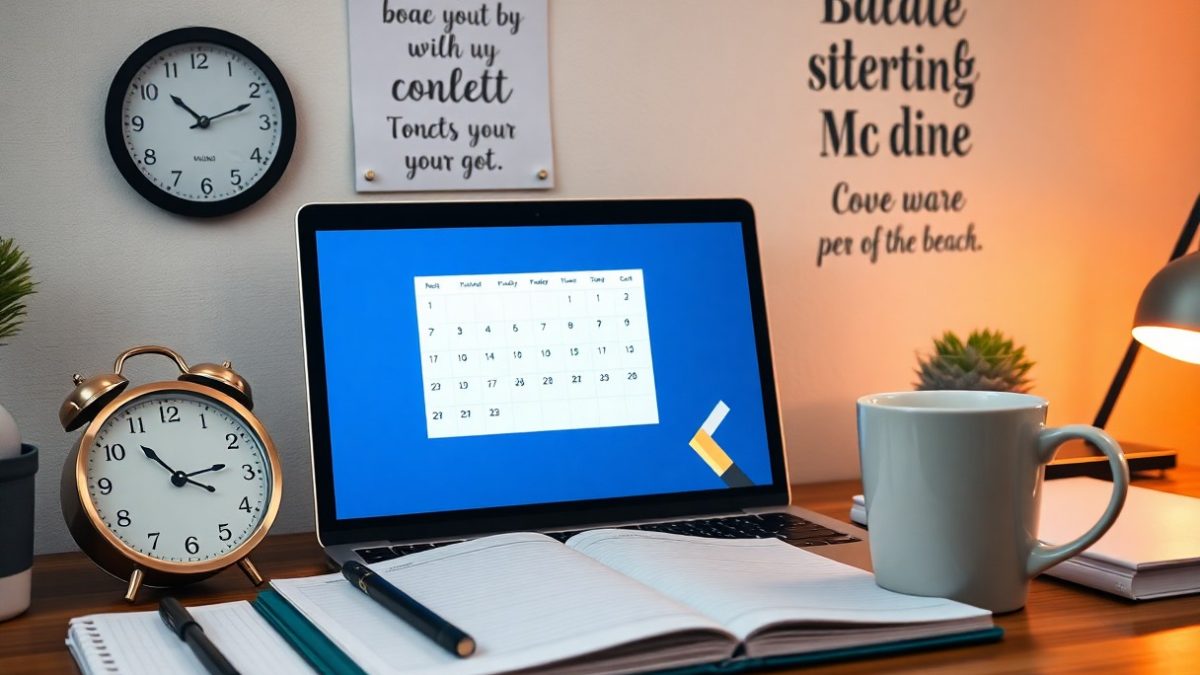
Time Management Tools You Need For Self-Improvement Success
December 9, 2024
Prioritize Your Goals – Time Management For Personal Success
December 11, 2024There’s a powerful connection between discipline and time management that can transform your productivity and overall well-being. By implementing effective time management practices, you can create structure in your daily routine, allowing you to focus on tasks that truly matter. This post will guide you through proven strategies to enhance your discipline, helping you make the most of your time and achieve your goals. Embrace these techniques, and watch as you become more organized, motivated, and in control of your life.
Understanding Discipline
Accurate understanding of discipline is vital for anyone seeking personal growth. Discipline is more than just self-control; it is the ability to consistently act in alignment with your goals and values. By cultivating discipline, you can develop habits that promote productivity and fulfillment, enabling you to achieve your aspirations more effectively. Embracing discipline allows you to navigate distractions and disturbances while maintaining focus on your priorities.
The Psychology of Discipline
Below the surface, discipline is rooted in psychology. It involves the interplay of motivation, willpower, and self-regulation. When you understand the mental processes that underpin your disciplined behavior, you can leverage them to develop better habits. Recognizing that discipline is a skill that can be cultivated through practice enables you to transform your mindset and elevate your performance over time.
The Role of Time Management in Discipline
About effective time management, it serves as a framework that supports and enhances your discipline. By organizing your tasks and activities, you create a structured environment where you can focus on what matters most. Time management techniques provide you with the tools to prioritize, schedule, and execute your plans efficiently, thus reinforcing your ability to stay disciplined in your pursuits.
Consequently, a well-implemented time management strategy can significantly improve your discipline. When you allocate specific time slots for tasks, you reduce the likelihood of procrastination and distractions. This structured approach helps you stay committed to your goals and fosters a sense of accountability. As you become more adept at managing your time, you will find that your self-discipline strengthens, enabling you to achieve greater success in your endeavors.
Key Time Management Practices
Some effective time management practices can significantly enhance your productivity and help you cultivate discipline. By implementing strategies such as setting SMART goals and utilizing prioritization techniques, you empower yourself to focus on what truly matters. These practices allow you to structure your day more effectively, ultimately creating a path to your personal and professional success.
Setting SMART Goals
An effective goal-setting strategy involves using the SMART criteria—specific, measurable, achievable, relevant, and time-bound. This approach ensures that your goals are clearly defined and attainable, which fosters a sense of accomplishment as you progress. By setting SMART goals, you enhance your motivation and can track your advancements, leading to greater discipline in your time management efforts.
Prioritization Techniques
On the path to enhancing your discipline, employing prioritization techniques is important. By identifying and organizing your tasks based on urgency and importance, you can allocate your time effectively. This process helps you focus on high-impact activities that align with your goals, streamlining your workflow and reducing the likelihood of distractions.
The Eisenhower Matrix is a powerful tool for prioritization that divides tasks into four categories: urgent and important, important but not urgent, urgent but not important, and neither urgent nor important. By categorizing your tasks this way, you gain clarity on what to address first, enabling you to make better decisions about where to invest your time. Additionally, the ABCD prioritization method—where tasks are labeled as A (highest priority), B, C, or D (lowest priority)—can further streamline your workflow. Adopting these techniques allows you to manage your time more effectively, fostering discipline in achieving your objectives.
Tools for Effective Time Management
Now that you understand the importance of effective time management, it’s time to explore the tools that can help streamline your process. Incorporating the right tools into your routine can significantly enhance your ability to manage time efficiently, helping you cultivate discipline and achieve your goals with ease.
Digital Tools and Apps
With a plethora of digital tools and apps available, you have the power to transform how you manage your time. From task management applications like Trello and Asana to calendar tools such as Google Calendar, these platforms are designed to keep you organized and on track. They allow you to set reminders, prioritize tasks, and visualize your schedule, making it easier for you to stay focused and productive.
Traditional Methods (Planners and Journals)
Above the tech options, traditional methods like planners and journals continue to hold value in time management. Many people find that writing down tasks and goals can enhance focus and retention, contributing to greater accountability. These methods allow you to disconnect from screens and take a more tactile approach to your planning, which can result in a deeper sense of connection to your schedule.
Digital tools have their advantages, but traditional methods provide a unique tactile experience that can enhance your time management skills. By using planners and journals, you can cultivate a dedicated space for planning your day, reflecting on your progress, and fine-tuning your approach. This allows you to maintain a mindful connection with your tasks, promoting a discipline that is often lost in the busyness of digital notifications. Consider incorporating these traditional techniques alongside digital tools for a well-rounded strategy.
Overcoming Procrastination
Despite your best intentions, procrastination can creep into your daily routine, hindering productivity and delaying goals. Acknowledging this tendency is the first step toward cultivating discipline. By understanding what prompts you to put tasks off, you can implement effective strategies to stay focused and accountable, moving closer to your objectives.
Identifying Triggers
Any effective approach to combating procrastination begins with identifying your triggers. Take note of situations or feelings that lead to avoidance behaviors. This could be feelings of overwhelm, fear of failure, or distractions from technology. By pinpointing these triggers, you can create targeted strategies to address them directly and minimize their impact on your productivity.
Strategies to Combat Procrastination
With a clear understanding of your procrastination triggers, you can employ practical strategies to overcome them. Break larger tasks into smaller, manageable actions to prevent feelings of overwhelm. Use time management techniques such as the Pomodoro Technique, where you work in focused bursts, interspersed with short breaks. These strategies not only enhance focus but also create a sense of accomplishment, motivating you to tackle remaining tasks.
Procrastination is a habit that can be broken with actionable steps. Establishing a routine helps to create structure in your day, minimizing opportunities for distractions. Set specific deadlines for tasks, even if they’re self-imposed, to instill a sense of urgency. Additionally, practicing self-compassion will allow you to recognize setbacks without harsh judgment, keeping you motivated to move forward. By implementing these strategies, you will find yourself taking action more consistently, leading to greater productivity and discipline in your life.
Developing Consistency
Once again, consistency is key in building discipline and improving your time management skills. Consistently adhering to your schedule will create a rhythm that helps you achieve your goals. For deeper insights into this vital aspect of discipline, check out Mastering Self-Discipline and Time Management: Strategies ….
Creating Habits and Routines
Around the formation of new habits, you set the foundation for stability in your daily life. Begin by identifying key activities that align with your objectives and incorporate them into your routine. Repetition will help solidify these habits, making them second nature over time.
Tracking Progress
Before you can fully gauge your consistency, you need to effectively track your progress. This practice enables you to identify patterns and adjust your strategies as needed, ensuring you remain aligned with your goals.
Understanding how to track your progress is necessary for maintaining focus and motivation. You can utilize tools such as journals, apps, or simple charts to record your daily accomplishments and setbacks. Regularly reviewing your progress offers valuable insights into what works best for you and where you may need to adjust your approach. This reflective practice helps you stay accountable and motivated, ensuring you cultivate discipline through consistent effort.

Enhancing Focus and Productivity
Not harnessing your focus can lead to wasted time and diminished productivity. You have the ability to cultivate discipline in your workflow by implementing strategies that sharpen your concentration. Whether through structured work periods or eliminating interruptions, enhancing your productivity is within reach. By consciously managing your attention, you can make significant strides towards achieving your goals efficiently.
The Pomodoro Technique
With the Pomodoro Technique, you can optimize your work sessions and enhance focus. This method involves breaking your work into 25-minute intervals, known as ‘Pomodoros,’ followed by a short break. This structured approach encourages you to concentrate intensely during work periods and refresh your mind periodically. Adopting this technique helps promote sustained attention and reduces burnout.
Minimizing Distractions
Besides structuring your work periods, minimizing distractions is important for maintaining your focus. You should evaluate your environment and identify potential interruptions that hinder your productivity. Consider factors such as notifications from devices, background noise, and the physical clutter in your workspace.
To effectively minimize distractions, create a dedicated workspace that is free of clutter and noise. Turn off notifications on your devices, and utilize apps that block distracting websites during work periods. Establish boundaries with others to ensure uninterrupted time blocks. By consciously managing your surroundings and eliminating distractions, you enhance your ability to focus and increase productivity in your tasks.
To wrap up
On the whole, cultivating discipline through effective time management practices is key to achieving your personal and professional goals. By prioritizing tasks, setting clear deadlines, and creating structured routines, you can enhance your productivity and focus. It’s imperative to regularly evaluate your progress and refine your strategies to better suit your evolving needs. By taking charge of your time, you empower yourself to build the discipline necessary for long-term success and fulfillment in your endeavors.

